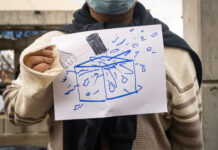
Being a student can be incredibly hard sometimes, especially while juggling life and work. When pursuing an education, students should be excited, but instead, many students are feeling the pressure.
“You remember that analogy where if you put a frog in boiling water, it will jump out, but if you slowly turn up the heat, it won’t notice until it’s too late? I think that perfectly sums up what happened to me,” says University of Utah student Clay Walker.
College students in Utah are facing a problem they may not want to acknowledge — their mental health. Student burnout is more than just being tired or sad. According to a recent article in the Salt Lake Tribune, Utah has the nation’s fifth-highest suicide rate.
The American College Health Association’s National College Health Assessment found some troubling results. In the mental health section of the report, roughly 55% of students felt overwhelmed by the workload that they had to do, and 30% of students felt an overwhelming anxiety within the two weeks prior to the survey.
Terri Mehlhoff, the clinic manager of Salt Lake Community College’s Center for Health and Counseling at South City Campus, says depression and anxiety are near 90% of all appointments.
After having a mental breakdown two years ago, Walker, with the help of his friends and family, checked into a hospital to get help.
“I had shouted the words, ‘I just want to kill myself,’ and I think that was the first time
that I had even realized what I was feeling and the first time I had ever vocalized it … And that was terrifying to me because when I said those words, I wasn’t just saying the words. I really meant it,” Walker confesses.
Walker says he and his family first tried to settle it by themselves.
“I had stayed home for a week and tried to recover while Chelsea [Walker’s wife] worked,” Walker says. Unfortunately, the situation only worsened.
Walker describes feeling like a burden on his wife, which led to a group decision with his therapist to check himself into the local psychiatric ward for recovery. Walker remembers the feeling at that time and is now hyper-aware of his mental health, and tries to keep everything in perspective.
“I remember sitting in the room with everyone else in my ward and feeling like these are people who are actively rooting for you to get better, and that stuck with me,” Walker says.
On student burnout and factors around student stress, Mehlhoff says, “I think as a culture we are taught to constantly push through and ignore the signals from your body telling you it needs attention.”
Thankfully, Walker paid attention to those signals. When he reached out to his family and sought medical attention, he made a hard choice that defies the culture of just pushing through.
Tevin Panelle, another student from the University of Utah, also suffered from a mental health crisis. Panelle echoes Mehlhoff’s thoughts regarding student burnout.
“Oh yeah, [my crisis] was totally avoidable,” Panelle says. “I haven’t had an issue since that first breakdown, but looking back at everything I had on my plate, while being a full-time student and a full-time employee, I could’ve done a lot to reduce pressure.”
In response to the rise of student mental health crises, schools are taking notice and implementing changes, reminding students of the resources they have at their disposal.
The University of Utah’s Center for Student Wellness, which includes the University Counseling Center, gives students a space to decompress and offers workshops focusing on managing stress and anxiety.
SLCC’s Center for Health and Counseling is open five days at week at South City and Taylorsville Redwood campuses. The Jordan Campus clinic is by appointment only.
Mehlhoff encourages students to keep a look out for signs of burnout. For instance, lack of motivation, craving sugary or high fat foods, sleep disturbances, brain fog and needing to be distracted.
“I think it’s good to look for that family member or friend that has suddenly sort of dropped out of daily life,” Mehlhoff adds. “They don’t hang out anymore, they don’t go to class, they call in sick to work … and it’s always appreciated when someone asks, ‘Are you doing okay?’ It’s part of our inane makeup to connect with each other, and it’s crucial to our existence and mental health.”
If you are feeling overwhelming pressure or anything described in the article above, reach out to someone: family, friends, or professionals.
Anyone facing a mental health crisis can call the National Suicide Prevention Lifeline at 1-800-273-8255.






